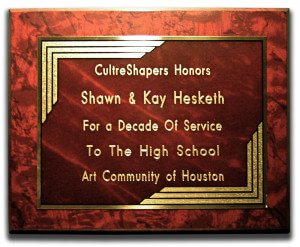My personal story of burnout…

Back in 2000, my wife and I co-founded a citywide art contest for high school students that quickly grew to become one of the largest art contests in the country. With the generous support of dozens of corporate sponsors, we awarded more than a million dollars to talented young artists from all around the Greater Houston area.
It was the realization of a personal dream of mine to provide much-needed encouragement and financial incentive to young artists who wanted to pursue a career in the arts but were otherwise unable to do so.
Over the next ten years, Kay and I spent nearly every available moment working on the contest, holding fundraisers, cultivating strategic relationships with our sponsors, connecting with teachers and students, and of course, conducting the contest itself. The highlight of the year was an elegant banquet in a downtown hotel, where the winners of the annual contest were announced live before an enormous, cheering audience.
Nothing will ever replace the tremendous sense of joy I felt each time I shook hands with the winners, presenting them with a check that often meant the difference between attending an art school of their choice or giving up on their lifelong dreams to pursue art as a career.
But, as personally rewarding and meaningful as this project was, we grew tired. The effort required to put on endless golf tournaments and wine auctions eventually began to take its toll. While we had the support of hundreds of volunteers for the big events, the bulk of the daily operations fell to Kay and I, and over time, it simply became too much to handle.
During the busiest times, we would sit down with our calendars to plan out the upcoming month, only to realize we’d have just one or two “discretionary” evenings in the entire month. No time for friends or family. But the work must be done. Right?
Sadly, we ignored these and other warning signs month after month, until we finally became completely and totally burned out. We’d lost our passion for the project. The day-to-day work became drudgery. We were both physically and mentally exhausted, even at the start of each day. We simply had nothing left to give.
Reluctantly, we came to the decision to resign our positions. I stayed on as a board member for a couple more years, but eventually even that responsibility became too taxing. In the end, we chose to walk away completely from the contest we had helped to create.
Thankfully, others stepped forward to continue the contest, which went on to serve thousands of students over the next several years.
Hindsight is 20/20.
Looking back on that difficult period of time, I wish someone had pulled us aside to point out just how detrimental our lifestyle had become to both our mental and physical health. Or how our choices would affect our ability to serve this worthwhile cause in the long-term.
I’ve taken the time to reflect on those years and extract a few lessons that I think might have spared us the painful decision to walk away from our own non-profit organization.
It’s my hope that one of these tips might stand out to you, help you to take a step back, make an honest assessment of your own work/life balance, and re-position yourself so that you can continue your own meaningful work for years to come.
With that as background, here are 7 things I wish someone had told me about how to avoid burnout.
1. Leave work at the office. (Then leave the office.)
You’ve probably heard that in order to succeed as entrepreneurs, you have to “outhustle” the competition. Put in more hours every day, and you’ll outpace the reset. But, your passion and commitment are not solely measured by the number of hours you put in every day. In fact, one surefire way to guarantee burnout is to never clock out.
Today, it’s far too tempting to be “always on,” engaged and connected 24/7, perpetually checking and responding to email, Twitter, Facebook, Slack, Instagram, and any number of other channels.
But in the long-run, this inability to prioritize your time and simply shut down will take an enormous toll on your both your mental and physical health.
Learn to better steward your time during work hours. Purpose to complete just the most important tasks during the allotted workday.
One practice that has helped me in recent years is to identify 1-3 MITs (Most Important Tasks) for the next day. Then, when you arrive at the office, knock those out first — before other distractions begin to fill up your day.
Before you leave work each day, take 5 minutes to write down the MITs for the next day. Then go home. Go eat. Go play.
It can be difficult to draw the line and unplug from work. But purpose to use your time at home to tend to other, more important parts of your life: your spouse, children, family, friends, or even your garden. Don’t worry… your work will still be there waiting for you tomorrow morning.
2. Just because you CAN doesn’t mean you SHOULD.
Look, you’re an incredibly skilled, multi-talented dynamo. But just because you possess such a wide range of talents doesn’t mean that you should employ all of them at all times, or in every endeavor.
I’m sure you’ve heard the phrase, “Jack of all trades, master of none.”
You may not know that it was originally offered as a compliment — without the second part. It was meant to suggest that the individual had learned such a wide variety of trades and skills that they were uniquely qualified to bring those disciplines together in an integrated, practical manner to accomplish a goal. This would be a wonderful thing… if you and I weren’t wired like we are.
Your greatest strength is often your greatest weakness, and so it is with being such a “Renaissance person.” You can do it all. But if you choose to do so indefinitely, you will most certainly burn out.
Instead, learn to identify your key strengths — just the one or two things that you do uniquely well, that are most in your ‘wheelhouse.’ Focus your energies on those areas and then delegate the rest. Share the burden — and the rewards.
Remember, doing everything with excellence doesn’t mean you have to do everything! Speaking of excellence…
3. “If it’s worth doing, it’s worth doing badly.”
Gilbert Chesterton wrote this in 1910, speaking of society’s need for both amateurs and professionals, generalists (“Renaissance people”) and specialists… particularly when it comes to “the things worth doing.”
There are certain things we don’t want a person to do at all unless they do them exceedingly well — like playing a musical instrument or performing life-saving surgery. But Gilbert was talking about the mundane, daily tasks that make up the majority of our lives, which “we want a man to do for himself, even if he does them badly.”
Obviously, Gilbert was not saying, “Do everything badly,” nor was he advocating for giving half-effort.
Generally speaking, striving for excellence is a good thing. But you and I are overachievers, obsessed with a relentless pursuit of perfection in everything we do. And it is this compulsion that often paralyzes us, resulting in inaction, and eventual burnout.
In my work as a graphic designer, I can tell you that I’ve never been completely satisfied with a project that I’ve shipped. I could have tweaked that letter spacing, enlarged that image, or adjusted that color slightly. But, if I chose to only deliver a project when I was completely satisfied with it, nothing would ever go out the door!
At some point, we have to let go and ship it.
Rather than obsessing over every detail in your work, look for areas where you can relax your relentless standards a bit, give yourself some grace, and trust the efforts of others. Which brings me to the next tip…
4. Recruit help.
Truly meaningful work attracts other people, and resonates with their own deep-seated passions. These are folks who would love to co-labor with you, if only asked. Don’t be afraid to relinquish control of certain tasks, enlist their help, and empower them to take ownership of those areas within your organization.
On the other hand, if—after an appropriate length of time—you find that you’re still the only one (or two) doing all the work and no one else is coming alongside to join your cause, it may be time to ask yourself whether or not this is a truly worthwhile endeavor.
It’s far more likely that you’ve merely overlooked folks who are more than willing and eager to help, but who have not yet been invited to partner with you. Is it possible that you lack for help because you’ve not yet asked?
Kay and I took on nearly every aspect of the daily operations of our organization because we felt we could. In the end… we couldn’t. Looking back, it seems so obvious, but we should have brought in others to help. They were there. We just didn’t ask.
5. Pace yourself. This is a marathon, not a sprint.
Can you identify areas where you can slow down or better pace yourself?
Ask yourself, “Does this activity need to be done right away, or could it be done more effectively if I tackled it later, when I’m more fully energized?”
One of the mistakes we made was failing to celebrate the victories. Often, the morning after a major fundraiser or event, we immediately threw ourselves into preparations for the next one. Despite the fact that we had just invested a tremendous amount of time and energy—often burning the midnight oil—we failed to take the time to celebrate, enjoy some much-needed down time, and recharge our batteries.
Running a non-profit organization can tax your mind and emotions even more than “normal” business activity, due to the nature of your cause and the all-consuming passion you feel for it. You’re heavily invested. And it’s this drive that you must nurture and protect if you are to make it over the long haul.
So, take some time to enjoy a glass of wine with your partner. Take a trip. Walk on a beach.
Better yet, take “mini-vacations” for yourself every day… time during which you do the things that recharge and rejuvenate you. Keep your soul whole.
6. Your work does not define you.
You are not the sum of what you produce. Nor do you exist for the sole purpose of producing.
This has been one of the most challenging life lessons for me as a “Type A” individual — a self-motivated, multi-tasking workaholic who is always pushing to meet deadlines and has little tolerance for ambivalence or delays.
We also tend to be highly status conscious, overly-concerned with what others think of us.
As such, it’s far too easy for me to throw myself headlong into my work, falsely believing that my value and sense of self-worth rises or falls on how well it turns out. This is a sure recipe for burnout!
Fr. Richard Rohr wrote that our lives can be roughly divided into two parts: the “Path of Ascent” and the “Path of Descent.”
The first part of our young lives are spent ascending, striving, fueled by our achievements and egos. During this phase, we allow ourselves to be defined by our accomplishments — seeking validation from outside of ourselves. “Be all you can be!”
But, at some point in our lives, we begin to mature. We crest the mountain and begin the Path of Descent, learning that we are not defined by what we accomplish. We become less motivated by what others think of us and how we are perceived. Instead, we become more intrinsically motivated, and begin to jettison those things that we once allowed to define us.
You are uniquely valuable because of who you are, not because of what you do. And it is this awareness that enables you to do meaningful work without letting it define you.
7. Know when to walk away.
It may be that, upon reflection (particularly on the previous point), you’ve come to the conclusion that you no longer have the same passion you once had for this type of work or this cause. Maybe it’s simply time to walk away.
In the early days of our fledgling art contest, both Kay and I were deeply passionate about serving high school artists. And we continue to feel very strongly about this area of need. But if I’m brutally honest, our passion for this cause began to wane over the next ten years. We became parents. Then parents again. Our priorities changed. And while we were still dedicated to the cause, we no longer possessed the same level of enthusiasm or willingness to sacrifice ourselves that we once felt.
If you find that you no longer have that same intense passion for your work, first of all, know that it’s okay.
It doesn’t reflect poorly on you, because you’re not defined by what you do or what you produce. Give yourself a little grace and know that you’ve done what you could… you’ve given of yourself. And you will once again, even if it’s in a different direction or toward a different cause.
Ideally, look for someone who can take your place, ‘take the baton’ and continue running with your vision. Work with them to create a smooth transition, then step back and see what they’re able to do. Often, it’s this next person who will take the organization to new levels you only dreamed about. Remember, our job is to pave the way for those who will come behind us.
But I hope that this post has found you in time, and you don’t need to hand over the reins just yet. I hope you’ll draw strength from one or more of these tips and that they help you find a better, more sustainable balance that enables you to continue doing what you’re doing for years to come!
Has any of this resonated with you at all? Do you feel drawn to any one lesson in particular? I’d love to hear if this helps, or if you have a related question. Post a comment, send me an email, or schedule a call with me. I look forward to hearing from you!



4 Comments
So… you wrote this just for me, right? The fact that I:
Ungh. I need to retire from retirement.
Haha! Guess we can all use an occasional reminder to simplify, eh?
I’m certain that process never ends. But it sounds like you’re getting to choose the things you spend your time on, and that’s something!
When we pursue activities that contain their own intrinsic reward, I think it’s much more sustainable that doing things purely for extrinsic motivations.
Thanks for dropping by my little corner of the web, John, and for taking the time to weigh in. 🙂
Thanks bro!
It’s funny how things cross your path when you need a wake up call. I’m a self employed designer 5 weeks into a 150 page catalogue. I pulled 60 hours last week alone, lost my weekend (third week in a row) and am working until midnight and starting at 8am. I haven’t showered for three days and am eating lunch and dinner at the computer while working.
The client has me under the thumb trying to produce a job in 8 weeks that in the past has taken 5-6 months. Sadly it’s at about 80% completion.
They have me hooked into an online task management program and everyday new changes spew through into my inbox. There’s no escaping it.
It’s time to pull back.. Thanks for your article. I’m going for a shower! 🙂